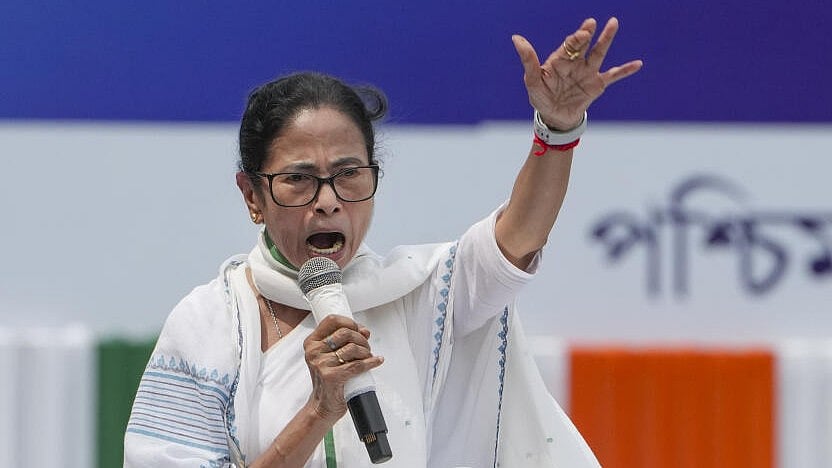
West Bengal Chief Minister and TMC chief Mamata Banerjee.
Credit: PTI Photo
As West Bengal’s Trinamool Congress scrambled to find a compelling storyline for the 2026 Assembly elections, its arch-rival, the Bharatiya Janata Party (BJP), handed Chief Minister Mamata Banerjee a political bazooka: the battle for Bengali identity.
In a state where language and culture are the lifeblood of its people, the BJP’s recent missteps have not only fumbled their game plan, but also served Banerjee a narrative so potent it could eclipse the mounting grievances against her government.
The Trinamool Congress (TMC) government has been under fire, battered by a litany of scandals — teacher recruitment scams, coal and cattle smuggling, sand and ration rackets — coupled with horrific incidents like the R G Kar rape-murder case, the South Calcutta Law College gangrape, and communal flare-ups in Murshidabad. Anti-incumbency was simmering, and voters were restless. Enter the BJP, which, in a baffling display of political tone-deafness, has handed the TMC a lifeline by reigniting Bengali sub-nationalism — a terrain where Banerjee thrives.
The BJP’s first blunder was raising the Bangladeshi deportation issue as a poll plank. On paper, deporting illegal immigrants sounds like a straightforward policy, and the Union government, led by the BJP, has the authority to enforce it. But in West Bengal, a state sharing a porous 2,217-km border with Bangladesh, this is no ordinary issue. The BJP’s ham-fisted approach — detaining Bengali Hindus and Muslims for ‘investigation’ in BJP-ruled states, with some wrongfully labelled as Bangladeshi — has stirred a hornet’s nest. West Bengal’s history is inseparable from Bangladesh; the Partition, the 1971 war, and subsequent migrations have woven Bangladeshi Hindus and Muslims into the state’s demographic fabric. In nearly every Bengali household, you’ll find someone with roots across the border.
Yet, the BJP’s central leadership, seemingly oblivious to Bengal’s cultural and historical nuances, has doubled down, turning a sensitive issue into a lightning rod for fear and resentment. Banerjee, ever the astute politician, has seized this opportunity, framing the BJP’s deportation rhetoric as an assault on Bengali identity. Her narrative is simple but devastating: the BJP is out to harass Bengalis by branding them ‘Bangladeshi’.
Whether the BJP intends this is irrelevant — perception is king in politics, and Banerjee is milking it for all it’s worth. Then came the BJP’s second, almost comical, self-inflicted wound. Amit Malviya, the party’s IT cell chief, tweeted in support of a Delhi Police press release that bafflingly labelled Bengali as the ‘Bangladeshi’ language, adding, ‘There is no language called Bengali.’ For a party already struggling to connect with Bengal’s soul, this was akin to setting fire to a cultural powder keg.
Bengali, or Bangla, is not just a language — it’s a cornerstone of identity, enshrined in the Eighth Schedule of India’s Constitution. Malviya’s tweet wasn’t just factually wrong; it was an insult, a political Hindenburg that can obliterate any goodwill the BJP has earned. In one fell swoop, the party alienated a state where language is sacred, evoking memories of the Bhasha Andolan — the 1947-1956 Bengali Language Movement in East Pakistan (now Bangladesh), which culminated in the tragic deaths of students on February 21, 1952, fighting for their linguistic identity.
That sacrifice inspired International Mother Language Day, and Banerjee is now channelling its emotional weight, positioning herself as the leader of a new ‘Bhasha Andolan’ to protect Bengali pride. The BJP’s blunders have done more than just hand Banerjee a narrative — it has shifted the conversation. Forget scams, violence, or misgovernance; the focus is now on culture and identity.
The appointment of Shamik Bhattacharya, a liberal urban face, as the BJP’s state unit chief was a chance to course-correct, to appeal to West Bengal’s cosmopolitan sensibilities. Instead, the party’s central leadership has squandered it, pushing a divisive, ill-informed agenda that plays right into the TMC chief’s hands.
The latest controversy involving Leader of the Opposition Suvendu Adhikari has only deepened the party’s credibility crisis. A video that went viral showed Adhikari stopping his car to confront a man who chanted ‘Joy Bangla’ — forcing him to shout ‘Jai Shri Ram’ and branding him a ‘Rohingya’. The incident sparked widespread outrage, reinforcing the perception of the BJP as both culturally disconnected and needlessly provocative in a state fiercely proud of its identity.
Even more telling, however, is the BJP’s glaring absence from the ground. From the protest at R G Kar Medical College to the ongoing agitations by SSC candidates and government employees demanding DA arrears — none of these movements have found a voice or support from the state’s principal opposition party.
Internally, the BJP continues to implode. Veteran leaders like former state president Dilip Ghosh — who led the party to its best-ever performance in 2019 and 2021 — are being sidelined. Worse, Ghosh is now openly criticising his party, yet there is no visible effort from the leadership to mend internal rifts. The result? The TMC is having a field day portraying the BJP as a fractured and rudderless force.
Yet, the BJP repeats its most self-defeating habit of placing all bets on Delhi. With elections looming, the party is once again bypassing its state unit, pinning its hopes on the towering presence of Narendra Modi and Amit Shah. But in West Bengal, their rhetoric, delivered in Hindi, often misses the mark. It alienates more than it inspires, further reinforcing Banerjee’s claim that the BJP is a ‘Bohiragoto’ (outsider) party, one that doesn’t speak the language of the Bengali people.
If the BJP hopes to remain relevant in West Bengal’s political theatre, it must learn to listen not just to its leaders in Delhi, but to the voices on the ground. Until then, the TMC’s dominance will go largely unchallenged.
(Sayantan Ghosh is a research scholar and teaches journalism at St. Xavier’s College (autonomous), Kolkata. X: @sayantan_gh)
Disclaimer: The views expressed above are the author's own. They do not necessarily reflect the views of DH.